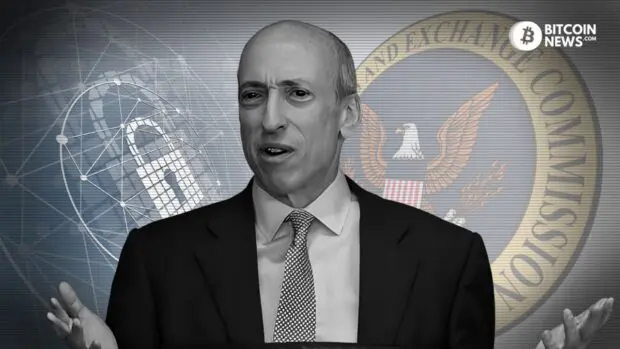When it comes to the evolving landscape of digital assets, name of the U.S. Securities and Exchange Commission (SEC) can be heard in most discussions. The regulatory agency has increasingly scrutinized various digital assets, classifying many as “unregistered securities.”
Bitcoin, known for its decentralized and authority-free characteristics, enjoys a unique status akin to a commodity. However, the public listing of Coinbase, a prominent digital asset exchange, intensifies the regulatory debate.
SEC and the “Unregistered Securities” Narrative
This move by the SEC sparks a wave of questions, particularly about its rationale in permitting a platform dealing with potentially unregistered securities to enter public markets. While Bitcoin enjoys relative regulatory clarity, the wider “crypto” landscape remains under close regulatory surveillance. This situation leads to pivotal inquiries: Why does the SEC allow public trading of an exchange like Coinbase, especially when Bitcoin is seemingly the sole digital asset exempt from being labeled a security?
Related reading: Bitcoin Is The Only Winner In SEC Clash
For Bitcoin enthusiasts, these regulatory discussions with the SEC might seem less critical, given Bitcoin’s more stable regulatory environment. Nevertheless, the decision to let Coinbase go public raises intriguing considerations about the SEC’s approach to the broader digital asset sector.
Understanding Securities and the Howey Test
At the heart of the SEC’s debate is the definition of what constitutes a security. In the U.S., a security is a broad financial instrument that can represent an ownership position in a publicly-traded corporation (stock), a creditor relationship with a governmental body or a corporation (bond), or rights to ownership as represented by an option.
The Howey Test, derived from the Supreme Court case SEC v. W.J. Howey Co., is a test to determine whether a transaction qualifies as an “investment contract,” and therefore would be considered a security under federal law. According to this test, a transaction is an investment contract if:
1. It involves an investment of money.
2. There is an expectation of profits from the investment.
3. The investment is in a common enterprise.
4. Any profit comes from the efforts of a promoter or third party.
This test is applied to various financial instruments and, more recently, to ICOs (Initial Coin Offerings) and “cryptocurrencies” to determine whether they are securities.
The SEC’s Stance on “Cryptocurrencies”
The regulatory body has applied the Howey Test to cryptocurrencies, resulting in many ICOs and digital assets being classified as unregistered securities. This classification requires them to adhere to federal securities laws, which involve significant regulatory compliance, including registration and disclosure requirements.
Many in the broader digital asset community argue that this approach is not entirely suitable for the diverse nature of digital currencies. They assert that such regulatory measures do not account for the decentralized and often non-corporate structure of many of these projects. There is a reasonable case to be made that Bitcoin is the only truly decentralized cryptocurrency, but that topic could take up an entire article.
Bitcoin: A Unique Case
Amidst this regulatory uncertainty, it is clear that Bitcoin, the first and most well-known cryptocurrency, will very likely be classified distinctly as a commodity. Their argument hinges on several key aspects of Bitcoin:
– Decentralization: Bitcoin is not controlled by any single entity, making it fundamentally different from company-issued stocks or bonds.
– Lack of an ICO: Bitcoin did not have an initial coin offering, a common process in which new cryptocurrencies are pre-sold to investors, often with the promise of future gains. This differentiates Bitcoin from many other digital assets scrutinized by the SEC.
– Widespread Adoption and Use: Bitcoin has attained a level of widespread adoption and recognition, often being likened to digital gold, which underscores its commodity-like characteristics.
Related reading: Is Bitcoin a Commodity? Explaining Bitcoin’s Superiority
Only Time Will Tell
The SEC’s ongoing efforts to categorize various digital assets as unregistered securities underscore the complexities that regulators encounter when applying traditional financial laws to the rapidly advancing digital asset sphere. Utilizing the Howey Test has provided some clarity, yet it continues to stir discussions and varying interpretations.
A predominant view among regulators is that Bitcoin’s decentralized essence and the absence of an Initial Coin Offering (ICO) justify its classification as a commodity, distinguishing it from other digital assets.
This ongoing discourse is far from being merely theoretical; it holds substantial consequences for the future regulatory framework governing digital assets in the United States. The full extent of these regulatory outcomes will gradually unfold, likely shaped by further legal actions and evolving interpretations.










